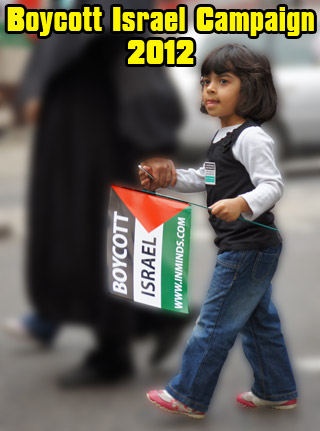
 Innovative Minds © 2014. All Rights Reserved. www.inminds.co.uk | ||||
John Berger rallies artists for cultural boycott of IsraelCharlotte Higgins, arts correspondent, The Guardian The celebrated novelist, critic and artist John Berger today calls on British writers and artists to undertake a "cultural boycott" of Israel. In a letter to the Guardian, co-signed by, among others, the artist Cornelia Parker, the musician Brian Eno, and writers Arundhati Roy and Ahdaf Soueif, Berger calls for support for "our Palestinian and Israeli colleagues". He suggests boycott tactics; in his case it meant declining to be published by a large mainstream Israeli publisher, he says. Yesterday he said of the boycott: "It could be a factor in Israeli policy changing. Of course its effects will not be gigantic but it is a way of not staying silent. It is a very personal call ... a way of encouraging the very courageous Israelis who oppose their government and an encouragement to Palestinians to somehow go on surviving." He made a clear distinction between individuals and state-sponsored events or institutions. "It is not a question of boycotting Israeli artists," he said. The film-maker Ken Loach, who backs the boycott, said he would not take part in state-sponsored Israeli film festivals. However, Nicholas Hytner, director of the National Theatre, said: "There are countless Israelis who vehemently oppose their government ... many are artists and academics, and none of them are prevented from expressing their opposition ... It seems profoundly counter-productive to cease contact with precisely that section of Israeli society most likely to provoke a change in direction within Israel." Richard Eyre, the theatre director, said: "I would have said during apartheid in South Africa sanctions ... were effective, but so many people since then have said they were counterproductive. It's not cut and dried. Anything that boycotts Israel means we are in danger of cutting off access to [those] we should be speaking to." The playwright Mark Ravenhill said it was good to keep a dialogue open with those challenging the government. "A cultural boycott runs the risk of stopping that dialogue and support." Michael Berkeley, the composer, said: "Sometimes it is only through the arts that a link remains open." SignatoriesJohn Berger, novelist, painter, art critic and philosopher Brian Eno, electronic musician, music theorist and record producer Sophie Fiennes, film director Eduardo Galeano, Uruguayan writer Reem Kelani, Palestinian singer Leon Rosselson, musician and writer Steven Rose, scientist Ahdaf Soueif, author Arundhati Roy, Booker Prize winner Elia Suleiman, film director and actor, and 85 others Source: http://www.guardian.co.uk/israel/Story/0,,1972653,00.html
Israel boycott may be the way to peaceThere is a fragile ceasefire in Lebanon, albeit daily violated by Israeli overflights. Meanwhile the day-to-day brutality of the Israeli army in Gaza and the West Bank continues. Ten Palestinians are killed for every Israeli death; more than 200, many of them children, have been killed since the summer. UN resolutions are flouted, human rights violated as Palestinian land is stolen, houses demolished and crops destroyed. For archbishop Desmond Tutu, as for the Jewish former ANC military commander now South African minister of security, Ronnie Kasrils, the situation of the Palestinians is worse than that of black South Africans under apartheid. Meanwhile, western governments refer to Israel's legitimate right of self-defence, and continue to supply weaponry. The challenge of apartheid was fought better. The non-violent international response to apartheid was a campaign of boycott, divestment and UN-imposed sanctions which enabled the regime to change without bloodshed. Today, Palestinians teachers, writers, film-makers and non-governmental organisations have called for a comparable academic and cultural boycott of Israel as offering another path to a just peace. This call has been endorsed internationally by university teachers in many European countries, by film-makers and architects, and by some brave Israeli dissidents. It is now time for others to join the campaign - as Primo Levi asked: "If not now, when?" We call on creative writers and artists to support our Palestinian and Israeli colleagues by endorsing the boycott call. Read the Palestinian call pacbi.org. John Berger John Berger and Michael Berkeley write at commentisfree.co.uk Source: http://www.guardian.co.uk/israel/Story/0,,1972612,00.html LettersSource: http://www.guardian.co.uk/israel/comment/0,,1976508,00.html John Berger and others' call for a cultural boycott of Israel (Letters, December 15) is wholly to be supported. The appalling human rights record of Israel during its 39-year occupation of Palestinian territories is amply documented, not least by Israel human rights organisations and in the writings of Uri Avnery, Norman Finkelstein, Baruch Kimmerling, Tanya Reinhardt and many others. Yet while continuing to carry out murder, torture, dispossession, the building of a wall on occupied land, as well as settlements, and the maintenance of an apartheid-like situation, Israel has continued to maintain full diplomatic, trading and cultural relations with other western states, not to mention its large US financial support. Israel is in receipt of trading privileges with the EU conditional upon its observation of certain norms of human rights, according to the Euro-Mediterranean Association agreement, but the latter clause remains a dead letter. A cultural boycott would be a first step towards demonstrating that such relationships must not be allowed to continue until Israeli policy and actions change significantly. Ian Pace
As a signatory of the letter supporting a cultural boycott of Israel, may I make the following points? 1) The boycott is not, as the objectors seem to think, aimed at individual Israelis but at state-sponsored events and institutions. Leon Rosselson
As a university student during the apartheid regime, the international cultural boycott was seen by all students as a necessary corrective to the falsity of the notion of a "liberal enclave", untouched by establishment influence. Unfortunately, rogue states - notably Israel - continued to trade with, and supply arms to, the regime. Stewart Henderson Also Of InterestPage URL: http://www.inminds.co.uk/article.php?id=45
|
|
Support Us
If you agree with our work then please support us.Campaigns INMINDS Facebook Live Feed Latest Video's
INMINDS Twitter Feed Tweets by @InmindsComFeatured Video's
You need Flash player 8+ and JavaScript enabled to view this video.
[all videos (over 200)..] Featured MP3 Podcast  "You cannot simplify the question of violence.. You look at human history - the American revolution, the civil war, the end of slavery in the United States, the African National Congress, the end of colonialism - by and large these were some combination of popular social uprisings and social movements and non-violent protests AND armed resistance. Now that doesn't mean I'm advocating for any armed action today, I'm not. I'm committed to finding ways of acting and speaking and making people laugh and doing art and disrupting the war machine in other ways, but I think focusing on violence when we have the comfort of being protected by mass of armed violence is not non-violence at all.. if you are pointing to the mass of violence and who's doing the mass of violence in the world today, you have to look to state violence - that's people bombing whole cities from the air.. " A founder of the Weather Underground, a revolutionary group that waged war against the US government in the 70s in response to the Vietnam War. Interview, Radio Neatherlands (TSWI) 30 June 2007 [12min / 6Mb] [all podcasts..] Newsletter Feedback |
 |
 |
















































